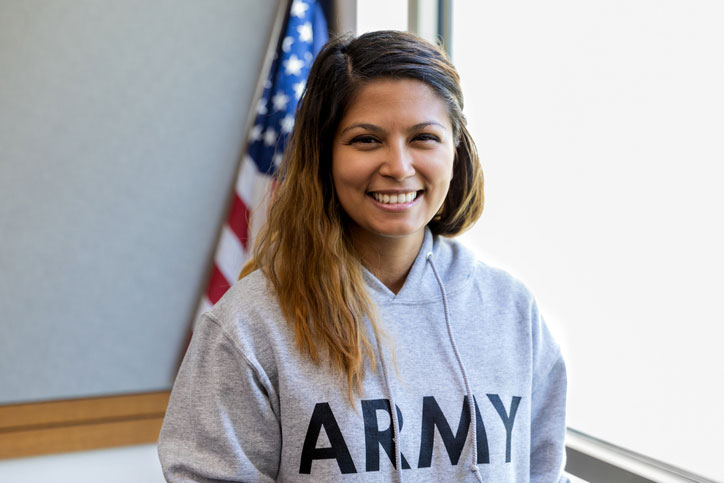Written by Scott Wilson

Florida has nearly 20 active military installations that represent every branch of the American military, with around 140,000 active duty personnel stationed here in any given year. That includes important training centers like NAS Pensacola and Tyndall Air Force Base in Panama City that rotate through thousands of other service members as they learn the ropes for their assignments.
Of course, once you have encountered paradise, it isn’t some place you want to leave. So around 1.4 million veterans have decided to make Florida home for the long haul.
Florida has the third highest number of veteran residents in the United States today.
As they do everywhere, people who have stepped up to serve don’t just lose that kind of civic commitment. So it’s pretty likely that there is a larger-than-average percentage of vets here who are looking to make a career in social work in the Sunshine State.
With the goodwill of the community and some superb federal and state resources to support you in that goal, you’ll have no trouble becoming a Florida social worker.
Service Members in Florida Can Start a Social Work Degree on Uncle Sam’s Dime While Still Active
If you are one of the 140,000 active duty service members stationed here while you formulate your plan to go into social work, you don’t have to wait for discharge to get started building your qualifications.
Every service member has access to a program known broadly as Military Tuition Assistance, typically referred to as MTA or just TA. Each branch has slightly different rules and requirements, but the basic idea is that you can access a chunk of change each year to pay for college studies on your own time, of your own choosing.
MTA will generally cover up to $4,500 per year in total tuition costs at rates up to $250 per credit. Your command has to approve your studies, and it can’t impact your current duties.
As an added bonus, schools in the Florida College System may waive fees for active duty members using MTA to pay tuition.
This is a perfect way to start knocking out credits toward an associate degree or eventual Bachelor of Social Work degree. Best of all, it doesn’t count against any of your post-discharge benefits, so you can stack them—an important consideration if you are heading all the way to an MSW program.
TAP Gets Florida Social Work Grads Set Up for Success in the Civilian World
Another thing to look forward to if you’re starting your journey while still on active duty is TAP, the Transition Assistance Program.
TAP is a mandatory pre-discharge process that pulls in resources from seven different major government departments to ensure vets have an easy time getting on their feet in the civilian world. It opens up a lot of resource for career planning that you can put to good use researching and building an action plan to become a fully licensed Florida social worker.
For a Lucky Few, Commissioned Roles Provide a Path to Earning MSW Degrees
 There are a select few paths to getting the military to pay for an actual, genuine Master of Social Work degree while you are still on active duty. That’s because there are genuine MOS (Military Occupational Specialty) billets for social workers in the Army, Navy, and Air Force.
There are a select few paths to getting the military to pay for an actual, genuine Master of Social Work degree while you are still on active duty. That’s because there are genuine MOS (Military Occupational Specialty) billets for social workers in the Army, Navy, and Air Force.
Each of them are officer billets, which is your first challenge. Typically, like other kinds of healthcare specialists, each branch seeks to recruit already qualified individuals for those roles.
But in the extremely rare case where you are both interested in transitioning to that position and the military is struggling to recruit, you may get Uncle Sam to send you to school for a free-ride MSW.
This happens through the Army’s Advanced Civil Schooling, the Air Force’s Civilian Institution Program, or the Navy CIVINS program. These are effectively scholarships that pay all tuition and fees, plus room, board, and supplies. Not to mention that you still get your regular pay, insurance, and other benefits while attending school!
Those resources include:
- Benefits explanations and career counseling services
- Access to DANTES, the Defense Activity for Non-Traditional Education Support, which can help you test into college credits based on military training
- Financial planning assistance for your transition to civilian life and potential schooling
- A gap analysis to help figure out what military skills you may carry forward to social work, and where you will need more training
- An employment workshop
If there is something that social work and military service have in common, it’s that planning is important. TAP meets the needs of both your old profession and the new.
The GI Bill® Offers Your Biggest Support Toward Degrees Needed To Become a Florida Social Worker

Of course, you can’t really talk about veterans education anywhere in the United States without talking about the most famous, most generous benefit of all: the GI Bill®.
The current version of this legendary program is called the Post-9/11 GI Bill®, and it’s the most comprehensive and best funded educational benefit that American service members have ever had.
For most vets, the GI Bill® will cover:
- In-state tuition rates at the college of your choice for a period of up to 36 months of full-time attendance. Private school rates are covered at a maximum of just under $30,000 per year.
- Up to $1,000 stipend for book and supplies costs based on your course load.
- Monthly housing costs equivalent to an E-5 Basic Allowance in your school’s area.
- Assistance in covering relocation costs to move to your school’s location if you are coming from certain rural parts of the country.
To qualify, you only need to meet one of three possible criteria:
- Have served on active duty for at least 90 days after September 10, 2001
- Have been wounded in action after September 11, 2001
- Have served on active duty for at least 30 days after September 10, 2001 and then been discharged for a service-related disability
You’ll also need to have a high school diploma or GED, but you need that before going to college anyway.
GI Bill® funds can be applied to both undergraduate and graduate programs, so they are equally useful whether you’re nailing down an associate degree or ready to start on your Master of Social Work degree.
While the Post-9/11 GI Bill® is the latest and greatest version of the program, it’s not the only one that veterans might use to cover their social work education. The Montgomery GI Bill® instead is a slightly more complex version. However, it’s also your major option if your service is in the Reserves or National Guard, which rely on the Montgomery GI Bill® Select Reserve program.
With the Forever GI Bill® Locking in Benefits for Life, It’s Proving to Be a Life-Saver for Florida’s Non-Traditional Social Work Students
 Forever GI Bill® provisions, which passed in 2017 were simply updates to the Post-9/11 GI Bill®. This eliminated the 15-year use-it-loose-it clause for anyone discharged after 2012, allowing this newer group of vets to access their education benefits without any time limits.
Forever GI Bill® provisions, which passed in 2017 were simply updates to the Post-9/11 GI Bill®. This eliminated the 15-year use-it-loose-it clause for anyone discharged after 2012, allowing this newer group of vets to access their education benefits without any time limits.
According to a NASW/CSWE survey from 2019, around a quarter of all MSW graduates are 40 years old. If that ends up being the case in your career, you’ll be glad to know that you can tap into those benefits at any time you choose thanks to the Forever GI Bill®.
It also offered new distance learning options for using those benefits, a real benefit for anyone taking advantage of Florida’s excellent selection of online social work degree programs.
Yellow Ribbon Support at Florida Social Work Schools Helps Cover More Expensive Tuition Rates
It is sometimes the case that the GI Bill® isn’t quite enough to get you across the finish line for some private school or out-of-state college tuition rates. A maximum contribution that’s just shy of $30,000 per year is pretty good, but it’s not always enough for elite private universities.
For those cases, you may be able to turn to the Yellow Ribbon program.
This is a cooperative effort between universities and the VA. Those schools that charge more than GI Bill® benefits cover agree to cover half the cost over the benefit rate; the VA picks up the other half. And you get the same result as if you were going to a less-expensive university: no out-of-pocket costs for tuition.
Because they are dipping into their own bank accounts to cover this cost, colleges sometimes limit the number of Yellow Ribbon students they support in a particular program at any given time. You’ll want to make sure it’s available before you count on it.
Universities in Florida with CSWE-accredited social work programs that participate in the Yellow Ribbon program:








Schools of Social Work in Florida Offering the VetSuccess on Campus Program

TAP will hold your hand while you are still in the process of separating from the service, but that kind of coddling doesn’t transfer into the private sector. Once you are discharged, there is still plenty of stuff to figure out:
- Required paperwork and deadlines for benefits applications
- How to put your service experience to best use in a college environment
- What courses are needed and how to schedule your studies for best use of your benefits
- The day-to-day expectations and academic challenges of college life
You’re mostly on your own for all that… unless you happen to enroll with a campus that has a VetSuccess on Campus counseling office.
VSOC staffs counseling offices with professionals who are familiar with both the college system and the military and VA systems. They know all the tricks and traps that come on both sides, and have the best ideas how to put all your resources together to get your social work education on track.
These CSWE-accredited schools also host VSOC offices:




More universities are signed up with VSOC all the time, though, so check their website to see if yours has been added to the list.
Unique Florida State Resources Devoted To Helping Veterans in School and Beyond

Most of the benefits listed so far are federally-mandated. There’s nothing special about living in Florida when it comes to getting the GI Bill® to cover your tuition.
But there are also additional benefits that you can access in Florida over and above your regular federal VA benefits. The Florida Department of Veterans’ Affairs runs down a range of benefits available to honorably discharged veterans in the Sunshine State:
- You won’t need the Yellow Ribbon program for Florida’s public universities, since all out-of-state tuition costs are automatically waived for vets or active duty attendees
- All undergraduate tuition costs are waived at state schools for recipients of the Purple Heart or awards preceding it
- Students actively receiving GI Bill® benefits at Florida state colleges receive priority course registration
- Fee waivers are available for disabled veterans receiving GI Bill® assistance but who are not 100 percent covered by that assistance
- Florida state institutions actively participate in programs offering credit awards for college-level training and education received in the service
On top of that, every public institution in the state university system of Florida has a Veterans Resource Center to help you work through your benefits and tap into other available assistance.
Other Organizations in Florida Dedicated To Helping Veterans With Education or Employment

With so many vets and active duty military members floating around the state, it’s only natural that plenty of other helpful non-profit organizations have popped up to help out in matters of career and education. You might tap into any of these outfits to help you get your social work career planning squared away:
This heavy-hitter in Florida vet affairs is a non-profit that was actually created by the state itself to look out for former military members. The goal is to promote Florida as the most veteran-friendly state, and VF does it with an exceptionally active Career Services Program to connect vets with employers, as well as the Veterans Florida Entrepreneurship Program which offers resources to help you get up and running as an independent practitioner once you have your LCSW license.
Florida Association of Veteran-Owned Businesses
Speaking of independent practitioners, once you start up your own social work practice, you will find a lot of new demands on your time and concepts to master… everything from small business tax filing to marketing. As a veteran, you will find resources to help you find your footing and get up to speed through FAVOB. With five local chapters across the state, this is an invaluable resource for networking as well as representation and information.
SVA is a national organization, but one with a strong Florida presence. These universities with CSWE-accredited schools of social work also host active SVA chapters:
- Florida Agricultural and Mechanical University (FAMU)
- Florida Atlantic University
- Florida Gulf Coast University
- Florida International University
- Florida Memorial University
- Florida State University
- University of Central Florida
- University of North Florida
- University of South Florida
- University of West Florida
SVA helps connect student veterans with their counterparts wherever they attend. Having that built-in support network is a kind of replica of the ways that your buddies backed up you while you were still in uniform—and it makes your transition to civilian life that much easier.
On top of that valuable role, SVA also offers more direct services. You can tap into their offices for:
- Academic advising and counseling
- Mentorship
- Career coaching, resume reviews, and interview prep assistance
- Funding for tuition through various scholarship opportunities k
National Guard Association of Florida
National Guard members and veterans often face particular challenges when it comes to accessing their educational and other benefits. They fall into different programs with different eligibility and paperwork requirements that most mainstream vet assistance programs aren’t so familiar with. In Florida, you can rely on the National Guard Association to help you get your education and employment needs sorted out. With scholarship and networking opportunities, NGAF can help you get your academic and employment goals as a social worker sorted out.
Vet Center Scholarship Program
The VA is a big employer of social workers nationally. On top of that, it’s their mission to support veterans. So veterans seeking to become social workers are getting a double-deal if they tap into this special scholarship program designed to pay for two years of graduate studies (plenty to fund your MSW degree). In return, you must commit to working for at least six years in social work at a VA Vet Center with an underserved or high veteran population.
Naturally, there are plenty of other funding and scholarship opportunities available to anyone who is planning to become a social worker in Florida. You are likely eligible for most or all of those opportunities on top of your special veterans benefits.
The biggest benefit of all, however, may simply be your demonstrated commitment to the safety and well-being of your country. You have served that community honorably in the military; you’ll be a stand-out addition to serving your community anywhere in Florida in your new role as a social worker.
